The unique blend of traditional culture and contemporary makes Japan one of the most fascinating countries in the world, and so it is no small wonder that many older Japanese people are proud to be its citizens.
But what about the younger generation? How does Japan stack up against the world in their minds?
Philanthropic organization Nippon Foundation’s online survey conducted on 1,000 teenagers between the ages of 17 and 19 sheds light on this issue with a broad range of topics.
▼ Perhaps the most interesting is what they thought about Japan.
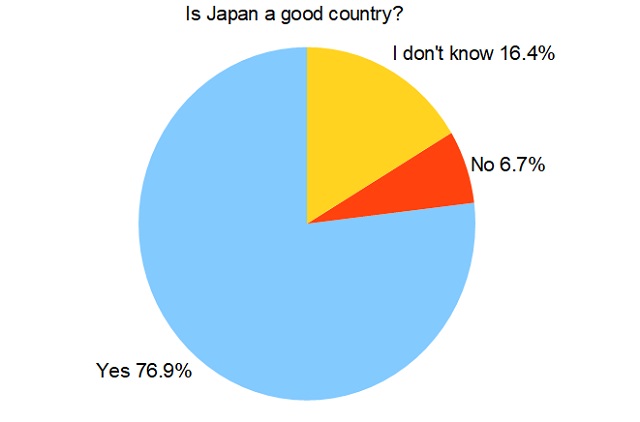
Among the reasons given by people who thought Japan was great, about half said it was because the country is peaceful, free of strife where citizens can simply enjoy meals in peace. Other reasons included safety, good water quality, and excellent influenza outbreak countermeasures. Many were aware of Japan’s unique culture, as well as the abundance of delectable cuisine.
Of the 6.7 percent who disliked Japan, some cited economic inequality, sexual discrimination, the rise of black companies, and difficult living conditions as factors in their responses.
▼ When asked about the things Japan is best known for, the top five were as follows.
(Multiple entries allowed)
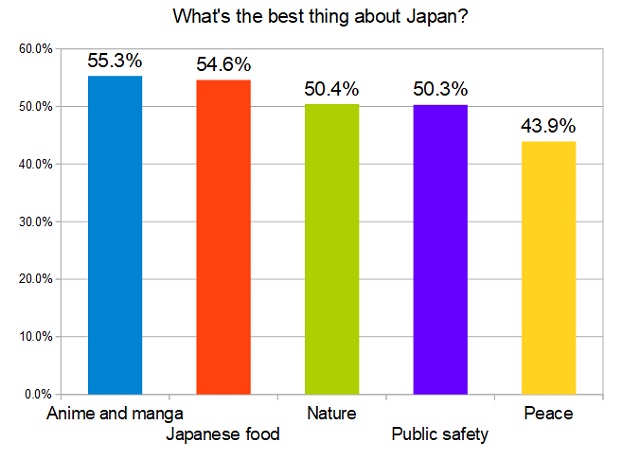
Pumping out outstanding anime like "One Piece" and "Dragon Ball," Japan has indeed kept the world entertained with its constant supply of awesome animation.
▼ Teenagers these days are also very aware of Japan’s shortcomings.
(Multiple entries allowed)
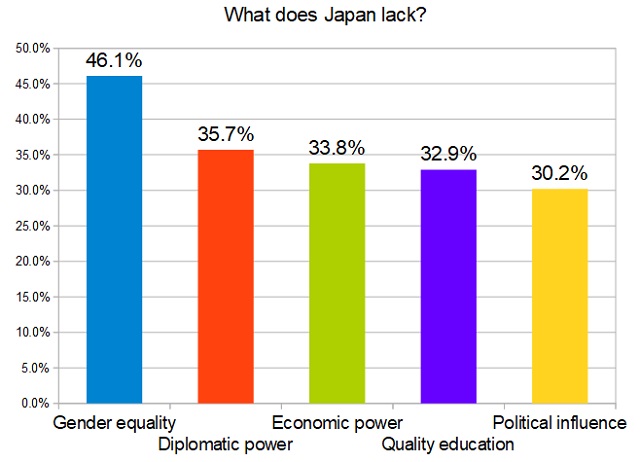
Gender inequality is very evident in the country, with men often holding positions of power, and many other outdated ideas.
The Nippon Foundation survey is the 14th such, and it also touches on whether young Japanese people are interested in countries other than their own.
▼ For example, do they want to live abroad in the future?
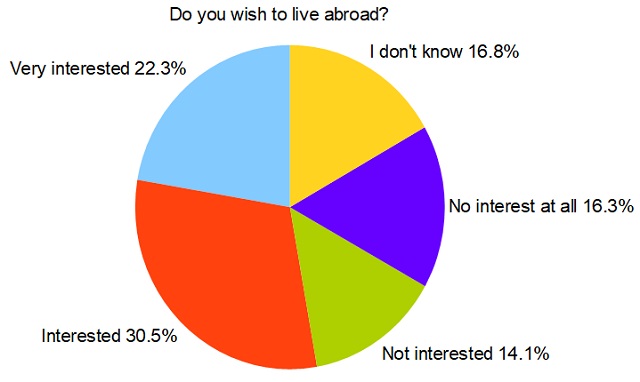
Knowing more than half of respondents hope to explore the world out there is a very heartwarming thought.
(Multiple entries allowed)
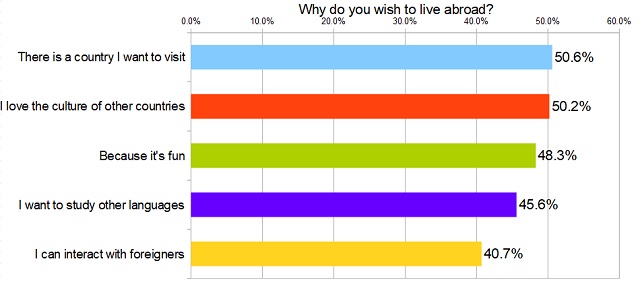
Japanese students often come into contact with other cultures early in their childhood, mostly from assistant language teachers at school who offer them a glimpse into another country.
▼ Those not interested had valid reasons, too.
(Multiple entries allowed)
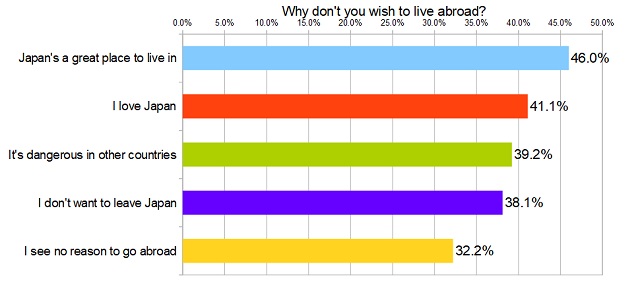
Once you get used to Japan’s 24-hour convenience stores, trains that arrive on time, cleanliness, and relatively low level of crime, it is pretty difficult to imagine living anywhere else.
Nippon Foundation’s survey affords an intriguing peek into the minds of young Japanese people, and it is refreshing to see that young Japanese people are quite aware of their nation’s strengths and weaknesses. Not to mention that a healthy percentage of teenagers wish to journey into lands to see what other cultures offer.
Source: Nippon Foundation via Nico Nico News, Hachima Kiko
Read more stories from SoraNews24.
-- Japanese survey reveals over 60 percent of blind people with guide dogs get turned away by shops
-- Foreigner investigated for truck-flipping thought it’d be OK since “Japan is crazy at Halloween”
© SoraNews24 Take our user survey and make your voice heard.
Take our user survey and make your voice heard.















21 Comments
Login to comment
jcapan
Wow, compelling analysis.
Japan has a lot going for it. I didn't come here b/c it's horrible. Among some of the reasons: kids can remain relatively innocent for longer periods of time, there are far fewer self-absorbed people who never shut up about themselves. It's cleaner, safer, stores offer far better service, and health care is much cheaper.
That said, I'm not sure if teenagers anywhere have the understanding or experience to evaluate their native culture or society relative to rest of the world. I only fully understood some of America's many failings once I spent significant time abroad.
Regarding that lack of firsthand experience, I'd mention the above votes for "nature" as one of Japan's greatest attributes. The overwhelming majority of Japanese live in fairly bleak urban landscapes almost entirely bereft of green spaces. Send a few thousand teenagers to Vancouver or Sydney or Portland, Oregon, and then have them report back to us about nature. In my experience, what it means here is a zen garden oasis surrounded by brutalist architecture or a perfectly manicured string of cherry trees along concrete covered river embankments.
I regularly teach Japanese uni kids before and after they go on exchange programs--the changes they undergo are always fascinating. A junior just returned a few weeks ago and immediately noted how passive and immature her classmates were, frankly admitting that last year she was just like them. She also lamented that she has no choice but to fall back in line.
kohakuebisu
As jcapan says, Japanese people are raised in a "Japan is wonderful" bubble. Schoolkids in particular have limited opportunities to get out and learn more, so you cannot expect them to be objective. TV just offers up fake people saying "I'm glad to be Japanese" and self-absorbed stuff like two-hour specials on how one prefecture's miso soup is different to another's. People don't even get nature programs, hence the misconception that modern Japan is remarkable for "nature", not the concrete covering it.
tamanicomment
I think Japan is a good country but is far from being a great country. Japan has many things going for it, but the country as a whole needs to afford itself more time to rest and enjoy life’s pleasures. Mental illness, depression, substance abuse (alcohol), and suicide are the results of an educational system and a labour system which demand far too much time and energy, leaving people to question exactly what it is they are living for. The war ended, however, the rhetoric of giving yourself for your country was transferred to the corporations who expect employees to sacrifice body, mind and soul, with little promise of improvements to their situation.
This is also drastically impacting Japan’s economy which has been gradually taking a turn for the worse. The cost of living in Japan is steadily increasing while minimum starting salaries have stagnated and the relatively low annual raises can’t keep up with the rising costs. Combine this with what little free time workers have to spend that money, in addition to the price-gouging that occurs during extend national holidays such as Golden Week and Obon where they actually have time to enjoy some of their hard earned cash, and most of that money ends up in other countries, or remains pilled up in the bank collecting dust.
If Japan finally did away with war-time labour practices, I believe that alone would fix many of the socio-economic problems that this country faces. Let people enjoy some freedom. Give them something to live for other than the unhealthy demands of the corporations.
thepersoniamnow
Personally the Japanese POV is HILARIOUS and completely out of date. I love hearing things like this, especially after 2 beers
since1981
They should survey young Japanese another others who have lived abroad for a year or more. Many of my friends kids who went to school (teenagers) and acquaintances who were transferred due to business for a year or more (to the States, England, Australia) say they would have loved to stay had the offer been given. Especially the kids loved the schools in the States and Canada. (sorry, can't speak for other countries) The wives/moms (husbands were transferred) found life in the states relaxing so much less stressful.
Laguna
I love my life in Kumamoto and raised two kids here. Sadly ~ or gladly, neither will return. The power of international economics is just too large.
garypen
Yes. Nationalism and ignorance of other cultures is a bad thing. It doesn't what nationality they are.
u_s__reamer
Most young Japanese people are insulated from the outside world like the proverbial "frogs in the well" with no personal experience to compare life in Japan with that of other countries. Their restricted "bell-jar" existence and dearth of life experience inside the " bonsai hot-house" of the education system produces an ignorance of the real world and a naivety that are disturbing. Thus compared to their peers in the West Japanese youngsters are perhaps less able to mature into autonomous, self-motivated individuals. On the optimistic side, opportunities for contact with other peoples and cultures are steadily increasing, but the straight-jacket of the Japanese education system still has a lot to answer for in limiting the intellectual horizons and emotional maturity of the kids.
jcapan
Jimizo, I agree that no country has a monopoly on ignorance or nationalism. But wouldn't you agree that ignorance or at least limited understanding is often the goal of conservative movements? How are Japanese to know there are alternatives to their way of life, better or worse, if there's not any objective discussion of comparative models? Obviously, the powers that be in Japan (in power literally forever) have little interest in stirring the pot. If they can maintain certain illusions about society and the world at large, people will be less likely to seek revolutionary change like not wearing heels to work.
And as your time in Texas no doubt attests, Americans by and large have no idea that their country is exceptional, sadly, in many of the worst ways (drug, crime, & incarceration rates, affordable health care, blatantly corrupt elections). They consider political options A & B when the world offers them myriad other, often superior choices (if only their schools or media would chose to discuss them). Japan is similar in this regard IMO. Students are afforded only the most superficial exposure to the wider world despite all the blather about global human resources.
bullfighter
This is a very valid point. The Japanese murder rate of 0.3 per 100,000 is indeed not exceptional among civilised countries. People from most European countries are not all that surprised by low murder and violent crime rates in Japan. It is mostly people from the US (4.7 per 100,000) who will be surprised and write about this in English, not people from Australia, Britain, or New Zealand.
It is however, worth noting, that while Australia, Britain, New Zealand, etc. have very low murder rates compared to the US to say nothing of Honduras (90.4), there murder rates are still 3-4 times those of Japan. Only Iceland, Singapore, and Lichtenstein are comparable to Japan.
https://www.worldatlas.com/articles/murder-rates-by-country.html
mmwkdw
In short. They think Japan is a boring place. Nothing happens here.... and that's also what they think of the current set of "Politicians". It's not an exciting place.. and 1/2 the country wishes to leave... which pretty much says it all.
DaDude
From people I have met, it has been 50/50. A lot of moms didn't like living abroad because they felt lonely and had difficulty making friends especially if the area they live in has few other Japanese to come in contact with. A lot of Japanese/Asians have the safety in numbers complex that they can't do anything without another Japanese/Asian person being nearby.
Elmer Fudd
I love the way the “Japan is a safety country” mantra is observed.
The death toll in my country in the last 100 years from earthquakes, Tsunamis, volcanos and typhoons is ZERO..... Japan?
The murder rate per 100,000 is pretty much the same in Japan as all the other civilized countries.
Jimizo
Is that such a bad thing? I know the cringeworthy TV shows asking foreigners to agree how wonderful Japan is are pure guff, but is it so bad and are they the only ones? I lived in Texas where many seemed to think the US is the only democracy in the world, political decisions in European countries are made by monarchs rather than elected leaders and bodies and the continent is covered with clouds all year.
When I go back to my own country, the UK, I tend to hear constant whining about a country which has “gone to the dogs” and “I bet ( fill in the blank ) isn’t as bad in Japan”.
These are the 3 countries I know best. Perhaps there are countries where most people have a balanced perspective.
Jimizo
Nationalism is awful. I’m ignorant of most cultures, as is almost everyone. I’ve met quite a few Brits back home who thought Japanese people spoke Chinese and Japan was a communist country. I met people in the US who asked me what language is spoken in the UK, thought London was a country and thought Elizabeth makes the laws of the country .
In my experience of the 3 countries I’ve lived in, people in Japan and the US tend to assume their countries are better despite having limited or incorrect knowledge of other cultures, and people in the UK tend to assume their country is worse despite having limited or incorrect knowledge of other cultures.
Mark40
Lies, to hell with gender equality. They picked those men because they are fitting for the job and capae of taking the hardest jobs, and theres a lot of evindence to prove it. Diversity hires only causes a company to fail and we have seen it happen time and time again.